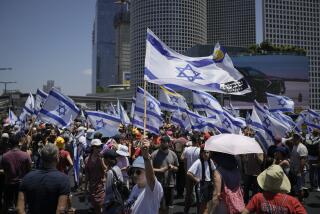500,000 Israelis in Public Sector Stage a Walkout
JERUSALEM — Nearly half a million Israeli public-sector employees went on strike Tuesday over a pay dispute, shutting down the country’s international airport, idling the Tel Aviv stock exchange and leaving some bereaved families with no help to bury their dead.
Early today, a special labor judge ordered the strikers back to work, although the dispute over unpaid back wages had not been resolved.
The nationwide work stoppage was the latest confrontation in an escalating battle between Israel’s powerful labor federation, the Histadrut, and Finance Minister Benjamin Netanyahu, who has been implementing strict austerity measures.
Israel’s socialist roots, closely entwined with its Zionist ones, date to the early days of statehood. But over the last decade, the country has been undergoing a sometimes-wrenching economic transformation as successive governments have implemented free-market reforms.
Most Israelis, particularly the young, have embraced the notion of a more open business environment and its greater moneymaking opportunities. However, by most accounts the gap between Israel’s rich and poor has widened considerably in recent years, and those who were already at the bottom rungs of the economic ladder are increasingly mired in hardship.
The austerity program championed by Netanyahu -- which includes deep cuts in social services and public-sector employment and moves toward privatizing some state-controlled industries -- has angered veteran Labor Party politicians. Former Prime Minister Shimon Peres, a Labor leader, has called it a form of “swinish capitalism.”
Disagreements over fiscal policy helped derail recent efforts by Prime Minister Ariel Sharon to woo Labor into a coalition with his center-right Likud Party -- an alliance that would have made it much easier for the Israeli leader to move ahead with his initiative to withdraw troops and settlers from the Gaza Strip.
At a Likud gathering Tuesday night, the prime minister was loudly heckled by members opposed to his Gaza plan, but he insisted once again that the pullout would proceed.
Months of intermittent work stoppages have done little to dent the stature of Netanyahu, Sharon’s strongest rival within Likud. Most Israelis across the political spectrum instead blame corrupt and inefficient local councils for falling months behind in paying public workers’ salaries, triggering strikes.
The effects of the strike, which the Histadrut said would be open-ended, were less severe than they could have been because the walkout took place during a “bridge” between two major Jewish holidays -- Rosh Hashanah, or the Jewish new year, celebrated last week, and the solemn commemorations of Yom Kippur, which will begin Friday. Many people are working sharply curtailed hours this week anyway.
Still, the walkout’s effects were widely felt. The strike by 400,000 workers closed airports and seaports and halted services such as mail and garbage pickup.
Hospitals handled only high-priority cases, fire departments were on an emergency-only footing and employees at private banks went on a sympathy strike with their counterparts in state-run banks.
Phone workers for the national carrier, Bezeq, refused to make repairs, although Israelis quickly turned that into a running gag, saying it was impossible to discern any difference.
One major disruption occurred at Ben-Gurion International Airport, where all flights were grounded and thousands of passengers stranded. Four arriving El Al flights that were aloft before the strike began were denied permission to land. After pleading and circling, they gave up and diverted to Cyprus, Vienna and Budapest, Hungary.
Striking along with public-sector workers were about 7,000 members of so-called religious councils -- rabbis and lay workers who, primarily in small towns, are charged with conducting weddings, funerals and other tasks.
Their walkout began Monday, and by the end of Tuesday, more than half a dozen burials had been delayed in places such as the tiny Negev desert community of Kiryat Gat.
“It’s not right that I and my friends had to be the ones to bury Dad,” a distraught Vadim Montzin told the Yediot Aharonot newspaper’s website after his father, Vasil, died just before the strike. Jewish tradition mandates that burial take place as soon as possible after death.
Some of the bereaved families have turned for help to a volunteer society, known by its Hebrew acronym Zaka, whose workers carefully gather human remains for religious burials in the aftermath of suicide bombings.
Estimates of the strike’s daily cost to Israel’s economy ranged up to $200 million. It was the third nationwide job action in the last 18 months, and economists say the number of workdays in Israel lost to walkouts far exceed the averages of even traditionally strike-prone countries such as Italy.
More to Read
Sign up for Essential California
The most important California stories and recommendations in your inbox every morning.
You may occasionally receive promotional content from the Los Angeles Times.









